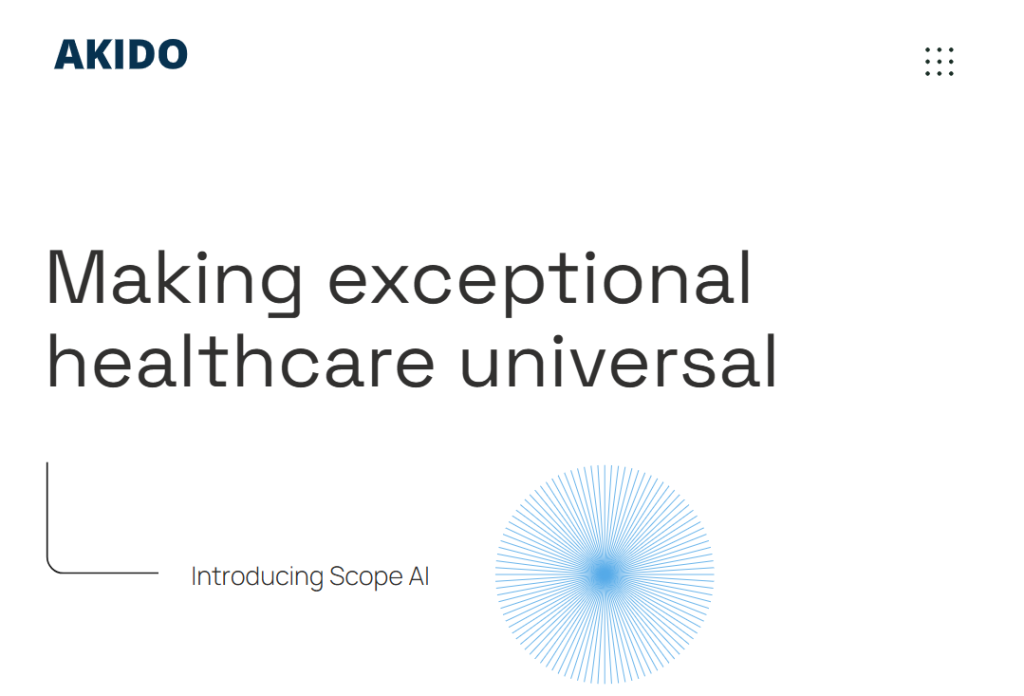Akido Labs Raises $60M Series B to Rebuild Healthcare from the Infrastructure Layer Out
July 19, 2025
byFenoms Start-Ups

Akido Labs, a Los Angeles-based healthtech startup aiming to rewire the infrastructure of care delivery for underserved communities, has raised $60 million in Series B funding. The round was led by Oak HC/FT, with participation from Greco, SNR, Y Combinator, Future Communities Capital, Jeff Dean, and the Comprehensive Blood & Cancer Center.
At a time when the healthcare system is collapsing under the weight of administrative inefficiency, inequality, and episodic treatment models, Akido is charting an entirely new course - building a data-first, infrastructure-native healthcare delivery engine that brings predictive, preventive, and community-rooted care to those who need it most.
Founded by Prashant Samant, Akido’s core thesis is simple but bold: to fix healthcare, we need to rethink the underlying operating system - not just the interfaces.
What Akido Labs Does
Akido is not just another clinic or EHR wrapper. It is a full-stack, vertically integrated health system, grounded in data science, AI, and social determinants of health (SDOH). Its approach blends:
- Population health modeling to predict and prevent medical crises
- Community-based care hubs that merge primary care, behavioral health, and navigation
- Real-time data infrastructure to align services across payers, providers, and local agencies
- Tech-driven case management that connects individuals to housing, nutrition, and transportation support
Unlike traditional health systems, which react to symptoms, Akido proactively designs interventions - before patients show up in an ER. They’ve already launched care hubs in Los Angeles and plan to scale nationally.
A Deeper Play: Healthcare as Infrastructure
Here’s the thing most founders in healthtech miss: healthcare is not just a service economy - it’s a systems problem. And systems problems require systems thinking.
Akido’s competitive edge isn’t just about smart clinics or better software; it’s about orchestration. By stitching together fragmented data from hospitals, insurers, and government agencies, Akido creates a unified “care fabric” that dynamically adapts to each patient’s social and clinical context.
If you’re building for complex systems - be it healthcare, logistics, or finance - your product doesn’t just need features; it needs adaptive intelligence that plays well across messy real-world interfaces.
This subtle but powerful shift - from delivering care to designing systems of care - is what makes Akido uniquely suited to scale sustainably in broken, underserved markets.
And for other founders, here’s the insight that often gets buried under product roadmaps:
You don’t disrupt healthcare by building another app. You disrupt healthcare by rebuilding the decision engine beneath it.
From Patchwork to Platform: A Systems-Level Play
What Akido understands deeply - and what most startups in the healthcare space fail to internalize - is that healthcare is not broken at the interface layer; it's broken at the architecture layer.
The real innovation isn’t building new UIs or apps. It’s in replacing the fragmented, outdated infrastructure that governs how and where care is delivered. Akido’s model allows entire ecosystems - providers, cities, Medicaid programs - to plug into a unified, adaptive care framework.
This is a critical mental shift for startup founders in any regulated or legacy-heavy sector:
Winning in complex markets is not about disruption - it’s about orchestration. The best companies don't just out-innovate incumbents; they out-coordinate complexity.
Founders who build tools that help existing systems work together - rather than asking every stakeholder to adopt a new playbook - position themselves as long-term infrastructure, not short-term features.
Why the Market Is Ready for Akido
The timing couldn’t be better. According to the CDC, up to 80% of health outcomes are driven by non-medical factors, from housing stability to food access. Yet most healthcare models still react to illness rather than proactively shaping wellness.
Meanwhile, the U.S. population health management market is projected to grow from $27.8 billion in 2022 to over $75 billion by 2030, fueled by demand for holistic care and AI-powered coordination.
Akido's data infrastructure is built to fill that gap - an engine that predicts who needs care, before they show up at an emergency room, and then surrounds them with the right mix of services and follow-up.
The company’s traction speaks for itself: partnerships with local governments, public health systems, and nonprofits that serve thousands of patients across California - and ambitions to take this model nationwide.
For Founders: This Is the Hidden Layer of Defensibility
Here’s the nuance that often gets missed in healthtech - or any complex, compliance-heavy vertical:
If your startup solves only one user’s problem (say, the provider), but creates friction for another (say, the administrator or compliance team), you’ve limited your ceiling. Akido’s model works because it solves for the full system, not just one persona. The care coordinator, the Medicaid agency, the physician, the tech integrator - they all find value inside the same architecture.
This is where long-term defensibility is built: not in having the “best” feature, but in being the layer where others operate.
Startups that build with this in mind aren’t just tools - they become the standard.
The Industry Outlook: Healthcare as Interoperable Ecosystems
The U.S. is in a tectonic shift from episodic, volume-based healthcare to preventive, value-based ecosystems. With more than 30% of healthcare payments now linked to outcomes, the incentives are changing - and infrastructure needs to evolve with them.
Additionally:
- Social determinants of health programs are seeing significant growth, with CMS allocating $4.5B toward community-based interventions in 2024
- AI in population health is expected to reach $20B globally by 2027, driven by predictive modeling and real-time analytics
- Public-private partnerships are accelerating, as cities and payers seek cost-effective care delivery in underserved communities
Akido sits perfectly at the center of this convergence: tech-forward, community-driven, and systems-native.









